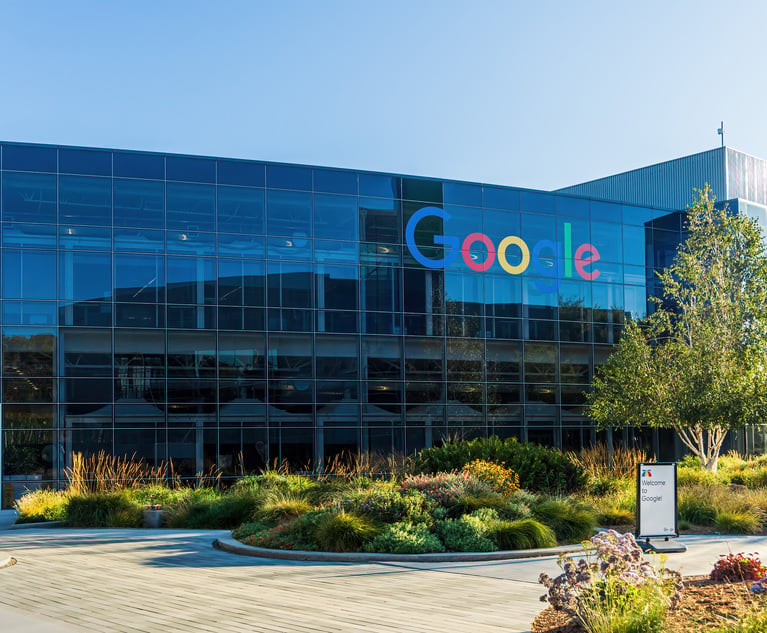The EU Just Fined Google $2.7 Billion. What Happens Next?
The decision by the European Commission will force the company to change the way it displays some search results, but also marks the opening of what is likely to be a long court battle and more civil litigation against the tech giant.
June 27, 2017 at 06:44 PM
5 minute read
SAN FRANCISCO — The decision by the European Commission on Tuesday to hit Google Inc. with a record antitrust fine of 2.42 billion euros ($2.7 billion) was hardly a surprise. EU officials had been telegraphing that the move was coming for weeks ahead of time.
But it's also not the last word in Google's testy relationship with EU competition regulators. Kent Walker, the company's top lawyer, indicated in a blog post Tuesday that Google intends to appeal the decision. Here's an overview of what will likely come next in the saga and how Google found itself in the crosshairs of the commission in the first place.
Can Google Fight the Decision?
Yes. Google can—and likely will—challenge the decision of the European Commission, according to Damien Geradin, an antitrust attorney at Euclid Law in Brussels. It will first have to appeal to the General Court in Luxembourg; if it loses there, it can appeal to the highest court, the European Court of Justice. But that is likely to be a long and winding road.
Take the example of Intel Corp., the subject of the next-largest EU antitrust fine ever, after Google. Intel was hit in 2009 with a 1.06 billion euro fine for antitrust behavior in the chips market. The company sued, and after initially losing at the General Court, the ECJ's advocate general last October reversed that ruling in an interim decision. A final order is still pending.
This content has been archived. It is available through our partners, LexisNexis® and Bloomberg Law.
To view this content, please continue to their sites.
Not a Lexis Subscriber?
Subscribe Now
Not a Bloomberg Law Subscriber?
Subscribe Now
NOT FOR REPRINT
© 2024 ALM Global, LLC, All Rights Reserved. Request academic re-use from www.copyright.com. All other uses, submit a request to [email protected]. For more information visit Asset & Logo Licensing.
You Might Like
View All
'Water Cooler Discussions': US Judge Questions DOJ Request in Google Search Case
3 minute read
Judge to Hear Arguments on Whether Google's Advertising Tech Constitutes a Monopoly
3 minute read
Read the Document: 'Google Must Divest Chrome,' DOJ Says, Proposing Remedies in Search Monopoly Case
3 minute read
Trending Stories
Who Got The Work
Michael G. Bongiorno, Andrew Scott Dulberg and Elizabeth E. Driscoll from Wilmer Cutler Pickering Hale and Dorr have stepped in to represent Symbotic Inc., an A.I.-enabled technology platform that focuses on increasing supply chain efficiency, and other defendants in a pending shareholder derivative lawsuit. The case, filed Oct. 2 in Massachusetts District Court by the Brown Law Firm on behalf of Stephen Austen, accuses certain officers and directors of misleading investors in regard to Symbotic's potential for margin growth by failing to disclose that the company was not equipped to timely deploy its systems or manage expenses through project delays. The case, assigned to U.S. District Judge Nathaniel M. Gorton, is 1:24-cv-12522, Austen v. Cohen et al.
Who Got The Work
Edmund Polubinski and Marie Killmond of Davis Polk & Wardwell have entered appearances for data platform software development company MongoDB and other defendants in a pending shareholder derivative lawsuit. The action, filed Oct. 7 in New York Southern District Court by the Brown Law Firm, accuses the company's directors and/or officers of falsely expressing confidence in the company’s restructuring of its sales incentive plan and downplaying the severity of decreases in its upfront commitments. The case is 1:24-cv-07594, Roy v. Ittycheria et al.
Who Got The Work
Amy O. Bruchs and Kurt F. Ellison of Michael Best & Friedrich have entered appearances for Epic Systems Corp. in a pending employment discrimination lawsuit. The suit was filed Sept. 7 in Wisconsin Western District Court by Levine Eisberner LLC and Siri & Glimstad on behalf of a project manager who claims that he was wrongfully terminated after applying for a religious exemption to the defendant's COVID-19 vaccine mandate. The case, assigned to U.S. Magistrate Judge Anita Marie Boor, is 3:24-cv-00630, Secker, Nathan v. Epic Systems Corporation.
Who Got The Work
David X. Sullivan, Thomas J. Finn and Gregory A. Hall from McCarter & English have entered appearances for Sunrun Installation Services in a pending civil rights lawsuit. The complaint was filed Sept. 4 in Connecticut District Court by attorney Robert M. Berke on behalf of former employee George Edward Steins, who was arrested and charged with employing an unregistered home improvement salesperson. The complaint alleges that had Sunrun informed the Connecticut Department of Consumer Protection that the plaintiff's employment had ended in 2017 and that he no longer held Sunrun's home improvement contractor license, he would not have been hit with charges, which were dismissed in May 2024. The case, assigned to U.S. District Judge Jeffrey A. Meyer, is 3:24-cv-01423, Steins v. Sunrun, Inc. et al.
Who Got The Work
Greenberg Traurig shareholder Joshua L. Raskin has entered an appearance for boohoo.com UK Ltd. in a pending patent infringement lawsuit. The suit, filed Sept. 3 in Texas Eastern District Court by Rozier Hardt McDonough on behalf of Alto Dynamics, asserts five patents related to an online shopping platform. The case, assigned to U.S. District Judge Rodney Gilstrap, is 2:24-cv-00719, Alto Dynamics, LLC v. boohoo.com UK Limited.
Featured Firms
Law Offices of Gary Martin Hays & Associates, P.C.
(470) 294-1674
Law Offices of Mark E. Salomone
(857) 444-6468
Smith & Hassler
(713) 739-1250






